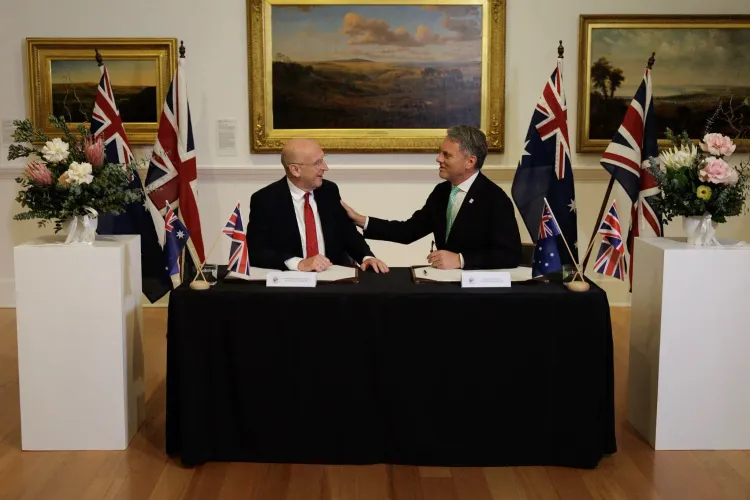Did Australia and the UK Just Sign a 50-Year AUKUS Treaty?

Synopsis
Key Takeaways
- The Geelong Treaty marks a 50-year commitment between Australia and the UK.
- It enhances defence cooperation focused on nuclear-powered submarines.
- The treaty aims to support the development of personnel and infrastructure.
- Concerns about nuclear proliferation persist amid the agreement.
- The US's role in AUKUS is currently under review.
Sydney, July 26 (NationPress) Australia and the United Kingdom (UK) have officially entered into a 50-year commitment to the AUKUS defence treaty, even as the United States continues its review of the agreement.
During a meeting in Geelong, Victoria, Australia's Deputy Prime Minister and Defence Minister Richard Marles and UK Defence Secretary John Healey signed the bilateral Nuclear-Powered Submarine Partnership and Collaboration Treaty, commonly referred to as the Geelong Treaty.
Marles and Healey characterized the Geelong Treaty as a historic agreement, emphasizing a commitment to the next 50 years of bilateral defence collaboration under AUKUS Pillar I.
The treaty facilitates extensive cooperation on the design, construction, operation, maintenance, and eventual decommissioning of their SSN-AUKUS submarines, as stated in the declaration.
Furthermore, it will support the development of personnel, workforce, infrastructure, and regulatory frameworks essential for Australia's SSN-AUKUS program. The agreement also includes provisions for port visits and the rotational deployment of a UK Astute-class submarine at HMAS Stirling under the Submarine Rotational Force-West, as reported by Xinhua news agency.
This signing occurs amid uncertainty regarding the United States' role in the AUKUS alliance, with the US Department of Defence currently assessing the trilateral security partnership to see if it aligns with the America First policy.
In their joint statement, Marles and Healey stressed that the Geelong Treaty builds upon the solid foundation of trilateral cooperation among Australia, the UK, and the United States, furthering the shared goals of the AUKUS partnership.
The treaty aims to foster the development of SSN-AUKUS submarines and resilient trilateral supply chains.
In September 2021, the US, UK, and Australia jointly announced the formation of a trilateral security partnership focusing on nuclear-powered submarines.
Australia's participation in this initiative, despite being a non-nuclear-weapon state, has raised significant concerns internationally regarding the potential for nuclear proliferation and the deepening military ties among these nations, which may jeopardize regional peace and stability.
According to Nine Entertainment newspapers, the Australian government recently made a second scheduled payment of 800 million Australian dollars (approximately 525.4 million US dollars) to the United States for the submarine agreement.









